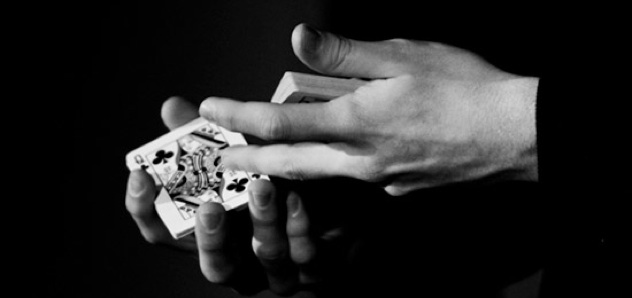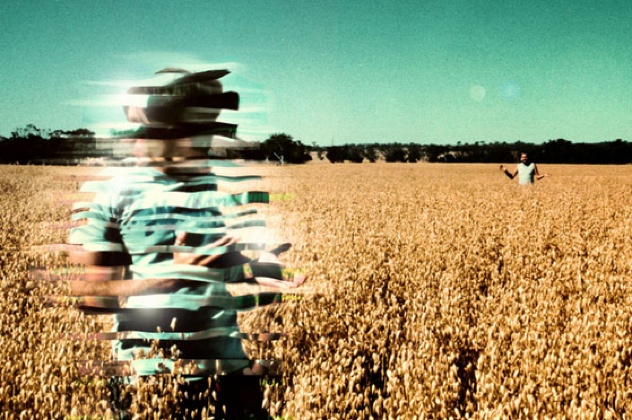(单词翻译:单击)
We all like magic and more importantly we all like to think we can work out magic tricks if we really want to. But as it turns out, even a simple card trick utilizes neuro-scientific principles to trick our brain in ways that we usually can't consciously control. So what exactly is wrong with our brain? Well nothing really, but years of evolution has left it with traits that leave it wide open to be duped by magic.
我们都为魔术着迷,更重要的是,我们都以为,只要我们想,揭秘魔术并不在话下,但即使一个小小的纸牌魔术都会麻痹掉我们的科学神经。我们的大脑有缺陷吗?当然没有,不过多年来,大脑已经进化出某些易被魔术愚弄的特质。
10.Focus
10.专注

Multi tasking is a myth, the human brain simply wasn't designed to focus on two things at once and magicians take full advantage. Our attention is pulled to one thing in particular due to the 'moving-spotlight' theory. In short, the theory says that our attention is like a spotlight, highlighting one thing while leaving what surrounds it in the dark. When an item or action is within the spotlight the parts of the brain involved in processing it work more efficiently, but anything beyond the spotlight is barely processed at all, at least not by our conscious mind. This allows magicians to pull a sleight of hand right under our noses, as long as something else is drawing our spotlight what happens beyond it, to our brain isn't happening at all.
多任务就是个神话,我们的大脑不能把注意力同时放在两样东西上,这可给了魔术师可趁之机。根据“移动聚光灯理论(moving-spotlight)”论,我们总会只把注意力放在一样事物上面。简而言之,我们的注意力就像一盏镁光灯,照耀了某事物,该事物周围的东西就都处于黑暗之中,而大脑中处理该事物信息的细胞特别活跃,而处理“背景”信息的细胞可以说根本没动,或者说并不是我们刻意去处理的,所以只要有一个东西先吸引走我们的注意力,其他东西发生了什么,我们都一无所知,魔术师就是靠操纵我们的思维盲点而工作的。
9.Made Up Memories
9.改变记忆

The 'misinformation effect' occurs when information we are given after an event alters our memory of it. For example, a magician asks you to choose a card from the left side of the deck and return it without telling him. Before the razzle-dazzle where he guesses your card he may say something like 'Now you chose any card you wanted, correct?' And in the heat of the moment you will say you did. The truth is you were only given the option of the left side of the deck, but the ambiguous comments from the magician alters how you remember the trick, leaving you with a false memory making the trick seem perhaps more incredible than it was.
某件事改变了你原来记忆就是误导信息效应。比如,魔术师要求你在左边那副牌中抽出一张牌,然后在不告诉他牌面的情况下把那张牌还回去,接着便是令人眼花缭乱的洗牌,在这个过程中,他一般会问:“你任意选了一张牌,对不对?”在这种千钧一发的激动时刻,你一般会回答:“是呀!”但事实是,你只能在左边那副牌任意选择一张牌,魔术师这种模棱两可的询问会把你带入这样一个误区:你会觉得这魔术比想象中更加不可思议。
8.Predicted Wrong Future
8.预估错误

When you see a ball get thrown in the air, it comes back down. You've a seen it a million times. You know that what comes up must come down and so does your brain. In fact because of something called the 'Memory-prediction framework' our brain sometimes remembers certain actions so well, it stops paying close attention because it predicts how they will end. When a ball gets thrown in the air our brain instantaneously recalls memories of similar events and produces an idea of what's going to happen next, but sometimes it's wrong. When a magician puts a ball in a cup only to have it disappear when the cup is lifted, we are shocked because what our brain predicted didn't come true. Our brains often feed us a prediction and convinces us we saw it happen, which leaves us even more shocked when the predicted action didn't happen at all.
一只球被抛向空中,然后又掉下来,这种情景我们看了无数遍,你知道这只球会先向上运动,接着向下运动。有一种东西叫“思维定势”,就是说我们知道接下来会发生什么,乃至从不把过多的注意力放在上面,因为我们心里十分清楚事情的结果是什么。所以当一只球被抛向空中时,我们大脑会瞬间调动所有类似回忆,预测接下来会发生什么。但有时候这种预估是不靠谱的。一位魔术师将装着球的杯子扔向空中,杯子飞出去了,球却不见了,我们瞬间便会震惊无比,因为我们预料的事竟然没有发生!我们的大脑总是装满了各种预估信息,我们也毫不怀疑这些预估信息的真实性,所以当预料的事没发生时,我们才会那么惊讶。
译:赵一力 来源:前十网


